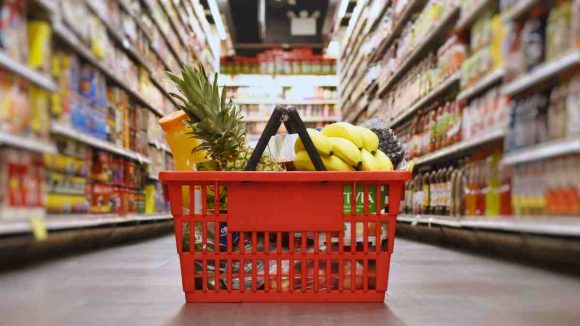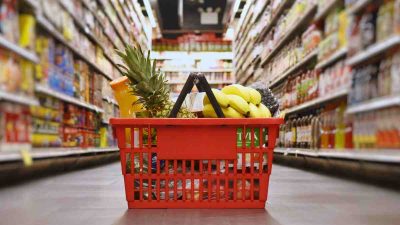Technology is at the forefront of innovation and sustainability. It can also be used to transform everyday food shopping habits into sustainable grocery shopping practices.
By leveraging advancements in food production, supply chain management, and consumer education, technology offers solutions to reduce waste and promote a more sustainable food system.
Here’s how technology is shaping the future of food retail and grocery shopping.
Understanding food waste
Food waste is a pressing issue that poses environmental and economic challenges.
With around one-third of all food produced being lost or wasted, it is essential to address this problem to create a more sustainable, secure food system.
ALSO READ: Sustainable grocery shopping: How to reduce food waste
Food waste occurs throughout the food supply chain, from production to consumption. But if we want to create a more sustainable food system, we’d need to reduce food waste first.
Technology’s role in reducing food waste
Technology offers innovative solutions to minimize food waste and enhance sustainability in the grocery industry.
From improving supply chain management to empowering consumers, technology plays a vital role in creating a more efficient and environmentally friendly, food processing system.
Food traceability and supply chain management
Technology assists in reducing food waste by enhancing food traceability and improving supply chain management. Since digital platforms are capable of tracking food products, technology can now reduce the risk of contamination, while also improving food safety.
By using data analytics, these technologies ensure that products are handled correctly and reach consumers in optimal condition.
Artificial intelligence (AI) also plays a role. AI can be leveraged for inventory management, predicting demand patterns, and minimizing overproduction and spoilage.
Digital platforms for online grocery shopping
These days, most online grocery shopping platforms offer solutions for reducing food waste by allowing consumers to purchase imperfect produce and reduce excess food packaging.
Many platforms also encourage users to buy “ugly” fruits and vegetables that might otherwise be discarded.
Many platforms also enhance their shopping experience by providing consumers with recipes and meal planning ideas. This helps shoppers get the most out of their order, while minimizing waste at home.
By using consumer preferences, promoting conscious buying habits and offering practical solutions for meal preparation, online grocery platforms play a pivotal role in reducing food waste and fostering sustainability.
Policy and regulatory impacts
Government and corporate actions are vital in shaping the landscape of sustainable grocery shopping.
Regulations and incentives from businesses can significantly influence the adoption of sustainable practices in the long run – from reducing food waste to minimizing environmental impacts.
Government initiatives and regulations
Governments around the world are taking steps to reduce food waste and promote sustainability through legislation and incentives.
France is a notable example. The country adopted a pioneering law on fighting food waste in 2016, which required supermarkets to donate unsold food to charities.
This approach not only benefits the environment by minimizing waste but also supports social welfare.
Meanwhile, sustainable packaging regulations are gaining momentum too. In 2020, the European Union has introduced ambitious targets to reduce single-use plastics and promote biodegradable packaging.
Known as the Circular Economy Action Plan, the initiative addresses the “unintentional release of microplastics into the environment.”
These regulations push grocery retailers to adopt eco-friendly packaging solutions, benefiting the environment and appealing to environmentally-conscious consumers.
Corporate responsibility and sustainability standards
Individual effort, while commendable, only goes so far. This is where corporations come into play.
Leading grocery chains like Tesco and Walmart have set targets for reducing carbon emissions, enhancing supply chain transparency, and promoting sustainable sourcing practices.
ALSO READ: Walmart’s climate action plan to achieve net-zero emissions
These initiatives often include commitments to sustainable seafood sourcing, organic produce, and fair trade products, showcasing a dedication to environmental and social responsibility.
The Benefits of Sustainable Grocery Shopping
Sustainable grocery shopping offers numerous benefits for both consumers and the food industry – from from the environmental impact and conservation to sustainable food production, and economic savings.
Environmental and economic benefits
By shopping sustainably, consumers reduce their greenhouse gas emissions while also conserving water and reducing waste.
This approach leads to a healthier planet by decreasing the demand for intensive farming practices that often result in environmental degradation.
For example, purchasing locally-sourced produce reduces the carbon footprint associated with long-distance transportation.
The economic benefit is that sustainable grocery shopping practices also reduce costs and save consumers money in the long run.
Buying in bulk, opting for seasonal produce, and minimizing food waste can lower grocery bills over time.
In addition, when consumers choose minimal packaging or biodegradable materials, it encourages manufacturers to adopt more environmentally friendly practices.
According to a 2019 study by the World Economic Forum, a circular economy approach in food systems could save $700 billion annually.
Social benefits
The social benefits of sustainable grocery shopping are multifaceted.
By promoting the purchase of safe and ethically-produced foods, sustainable shopping enhances food safety and reduces the risk of foodborne illnesses.
This is achieved by supporting local farmers and food producers who adhere to stricter safety, quality control, and hygiene standards.
Moreover, sustainable grocery shopping fosters a sense of community by encouraging consumers to support local businesses and farmers’ markets.
This not only strengthens local economies but also builds relationships between consumers and producers, leading to a more connected and resilient food system.
By implementing sustainable grocery shopping practices, grocery stores, food retail industry and consumers can help create a more sustainable food system.
About the author
Cheryl has contributed to various international publications, with a fervor for data and technology. She explores the intersection of emerging tech trends with logistics, focusing on how digital innovations are reshaping industries on a global scale. When she's not dissecting the latest developments in AI-driven innovation and digital solutions, Cheryl can be found gaming, kickboxing, or navigating the novel niches of consumer gadgetry.











